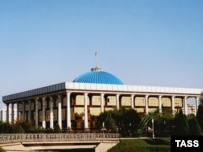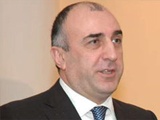by Maksud Djavadov
“The most widely propagated idea by the state controlled media in Azerbaijan is not the liberation of occupied Karabakh but the “unification” of Tabriz with the Republic of Azerbaijan: essentially, the partition of Iran. In the coming years, if not sooner it will not be surprising to witness Azerbaijan as the next U.S. theatre from which political, social and economic pressure will be exerted on Iran. The U.S. knows that Azerbaijan is Iran’s vulnerable spot.”
Iran has played an important role in the crucial events affecting global politics for at least 3,000 years. At no time in history, however, has Iran been more important in global politics than since the victory of the Islamic Revolution in 1979. Some historians might contend that during the rule of Cambyses II in 530 bc, Persia was at its peak because of the vast territory it controlled and the great power it wielded. But the Persia of those days was only first among equals. Indeed it controlled vast territory but it was a pagan state ruled by an absolute monarch with a hierarchy of social values and a political system similar to most other existing states at the time.
Thus, it was simply part of an established political order lacking its own unique character and an alternative system. The Islamic Revolution of 1979 is radically different because it challenged the Western-imposed political order by demolishing many key pillars of its control through the implementation of an alternative system of governance. At no time since the victory of the Islamic Revolution has Iran been more of a challenge to the colonial powers, especially the U.S., than it is now. This challenge manifests itself at different levels globally. The next most probable point where this confrontation will heat up will be the Republic of Azerbaijan.
The U.S.-Iran confrontation in Afghanistan, Lebanon and Iraq must be briefly analyzed in order to understand the potential for a new flashpoint. Before its invasion and occupation of Afghanistan the U.S. did not have direct military presence in regional conflicts. Prior to 9/11 the U.S. was mostly involved through its proxies, namely the authoritarian regimes in the Middle East and Central Asia. The only occasion when it became directly involved in a Middle Eastern conflict before the invasion of Afghanistan was the Gulf War of 1991, but even then Washington tried to reduce its involvement by making other countries pay 85% of the total war bill of $61 billion and by not marching on Baghdad.
After 9/11, the U.S. became a direct party to conflicts in the region. Many US officials thought that after invading and occupying Afghanistan, that borders Iran, Washington would gain the upper hand vis-a-vis Iran. In reality, the U.S. weakened its most powerful anti-Iranian partner in Afghanistan, namely the pro-Wahhabi movement of the Taliban. After the fall of the Taliban, Iran quickly moved into Afghanistan by investing over $600 million into the reconstruction of Afghanistan and strengthening the Hizb-e Wahdat Party, which shares similar ideals to that of Islamic Iran. Tehran also engaged selected elements in the newly formed Afghan government and secured some support. Through careful use of ideological and cultural bonds that unify the people of Iran and Afghanistan, Tehran managed to isolate the U.S. both politically and socially in Afghanistan. Washington tried to correct and compensate for its failure to pressure Iran through Afghanistan by occupying Iraq.
Official thinking in Washington was that by deposing Saddam Husain so easily and installing a new government, the U.S. would whip up Arab and Kurdish nationalist sentiment to exert pressure on Iran. Again the U.S. failed to see the strong Islamic bond between Muslims in Iraq and Iran. Elimination of the former U.S. ally Saddam, created a political, economic and social vacuum in Iraq. Islamic movements who shared the same political and existential ideals of Islamic Iran quickly filled the vacuum. Once again, the U.S. became isolated politically and socially and had to rely entirely on its military to pressure Iran. However, after targeting those forces the US deemed “pro-Iranian” and triggering Islamic resistance spearheaded by the Mahdi Army, the US realized the limits of its power due to its political and social isolation and halted its military offensive. The U.S. desperation forced its military and intelligence services to establish links with former al-Qaeda members. This new structure came to be known as al-Sahwa whose main purpose was and remains countering political movements in Iraq that are not hostile to Iran. This also backfired and the mighty “superpower” was for the first time accused by its allies in the region of incompetence due to its inability to fully control former al-Qaeda members. Nevertheless, the U.S. has not given up on its desire to dominate the region.
The U.S. launched its most desperate attempt to make up for losses against Islamic Iran by supporting Israel’s July 2006 aggression in Lebanon. Again, the US plan implemented by the Zionist military suffered a historic defeat at the hands of Hizbullah’s valiant resistance. The U.S. is currently trying to make up for its defeat by instigating armed conflict in Lebanon. This too is doomed to fail because of Hizbullah’s popularity among all segments of Lebanese society owing to its courageous defence of Lebanese territorial integrity.
The foregoing review brings us to the next point where another U.S.-Iran conflict, this time in Azerbaijan, is a strong possibility. No two countries bond more strongly religiously, culturally and historically than Iran and Azerbaijan. Although ethnic Azeris inhabit a large part of Iran where they have always played a key role in various aspect of the Islamic Republic, Tehran appears not to have paid as much attention to securing its interests in Azerbaijan as it did in Afghanistan, Iraq and Lebanon. Azerbaijan is the only country where Iran’s interests are vulnerable while the U.S. has struck deals with Baku to secure its interests. Azerbaijan alone openly supports the presence of forces hostile to Islamic Iran despite no direct U.S. military presence on its soil. Anti-Iranian forces are protected by the current regime in Azerbaijan. All other strategic locations bordering Iran that host opponents of Islamic Iran, also host U.S. military personnel because the proxy governments alone are not able to fully secure American interests. This is not the case in Azerbaijan.
Over the years, the U.S. has built two radar stations in Azerbaijan. The first is located north of Baku while the second is near Azerbaijan’s southern border with Iran in the region of Astara. Officially, the American sponsored radars are designed to monitor the movement of weapons of mass destruction; unofficially, they are there to spy on Iran. The current Azeri regime has been a staunch supporter of U.S. strategic advances in the region. Baku supported the invasions of Afghanistan and Iraq by contributing troops and therefore conferring legitimacy on the fiction that the US had international support. Apart from siding with Iran’s political rivals, the Azeri regime that maintains tight control over the media has also been bolstering anti-Iranian sentiment inside Azerbaijan for over a decade.
The most recent example was the anti-Iranian propaganda played out on September 3, 2007. From this date onward, major Azeri media sources continuously reported “breaking news” about alleged Iranian citizens serving with armed gangs of Armenian nationalists in Karabakh. The propaganda portraying Iran as an ally of the occupation forces in Karabakh is an old stunt, but one that has a strong effect. Iran has so far not countered even such false reports by simply reminding the Azeris that it was Iran that aided the arrival of 1,300 Afghan volunteers to fight for Azerbaijan during the war with Armenia. The Azeri regime blocks all information that may show Iran as a friend of the Azeri people.
On the political landscape in Azerbaijan, Iran lacks the kind of allies it has in Iraq, Afghanistan and Lebanon. Most socio-political NGOs in Azerbaijan and the so-called political “opposition” groups are funded by the U.S. and its allies. However, any contact between Azeri socio-political movements with Islamic institutions in Iran is immediately branded as espionage by the Baku regime and the people involved are punished harshly. In addition to the government’s systematic policies against Islamic Iran, the regime has also managed to create a strong sense of Iranophobia in a small, but significant portion of Azeri society.
The U.S. knows that unlike Iraq where Iran has the support of the Supreme Council of the Islamic Revolution in Iraq and Lebanon where Hizbullah is a committed ally of Iran, in Azerbaijan Iran has few allies to counter U.S. pressure. Perhaps there is inadequate realization in Tehran that the Azeri government has supported all of the strategically important U.S. policies aimed at exerting pressure on Iran. The most widely propagated idea by the state controlled media in Azerbaijan is not the liberation of occupied Karabakh but the “unification” of Tabriz with the Republic of Azerbaijan: essentially, the partition of Iran. In the coming years, if not sooner it will not be surprising to witness Azerbaijan as the next U.S. theatre from which political, social and economic pressure will be exerted on Iran. The U.S. knows that Azerbaijan is Iran’s vulnerable spot.
Source: usa.mediamonitors.net/, October 4, 2009)



 The Uzbek parliament building in Tashkent (file photo)
The Uzbek parliament building in Tashkent (file photo)




